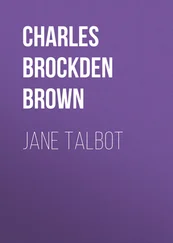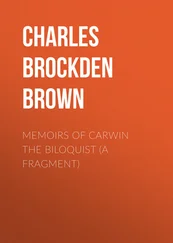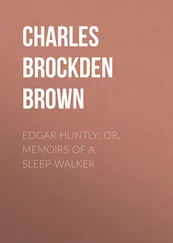But its effect upon my brother's imagination was of chief moment. All that was desirable was, that it should be regarded by him with indifference. The worst effect that could flow, was not indeed very formidable. Yet I could not bear to think that his senses should be the victims of such delusion. It argued a diseased condition of his frame, which might show itself hereafter in more dangerous symptoms. The will is the tool of the understanding, which must fashion its conclusions on the notices of sense. If the senses be depraved, it is impossible to calculate the evils that may flow from the consequent deductions of the understanding.
I said, this man is of an ardent and melancholy character. Those ideas which, in others, are casual or obscure, which are entertained in moments of abstraction and solitude, and easily escape when the scene is changed, have obtained an immoveable hold upon his mind. The conclusions which long habit has rendered familiar, and, in some sort, palpable to his intellect, are drawn from the deepest sources. All his actions and practical sentiments are linked with long and abstruse deductions from the system of divine government and the laws of our intellectual constitution. He is, in some respects, an enthusiast, but is fortified in his belief by innumerable arguments and subtilties.
His father's death was always regarded by him as flowing from a direct and supernatural decree. It visited his meditations oftener than it did mine. The traces which it left were more gloomy and permanent. This new incident had a visible effect in augmenting his gravity. He was less disposed than formerly to converse and reading. When we sifted his thoughts, they were generally found to have a relation, more or less direct, with this incident. It was difficult to ascertain the exact species of impression which it made upon him. He never introduced the subject into conversation, and listened with a silent and half-serious smile to the satirical effusions of Pleyel.
One evening we chanced to be alone together in the temple. I seized that opportunity of investigating the state of his thoughts. After a pause, which he seemed in no wise inclined to interrupt, I spoke to him—"How almost palpable is this dark; yet a ray from above would dispel it." "Ay," said Wieland, with fervor, "not only the physical, but moral night would be dispelled." "But why," said I, "must the Divine Will address its precepts to the eye?" He smiled significantly. "True," said he, "the understanding has other avenues." "You have never," said I, approaching nearer to the point—"you have never told me in what way you considered the late extraordinary incident." "There is no determinate way in which the subject can be viewed. Here is an effect, but the cause is utterly inscrutable. To suppose a deception will not do. Such is possible, but there are twenty other suppositions more probable. They must all be set aside before we reach that point." "What are these twenty suppositions?" "It is needless to mention them. They are only less improbable than Pleyel's. Time may convert one of them into certainty. Till then it is useless to expatiate on them."
Table of Contents
Some time had elapsed when there happened another occurrence, still more remarkable. Pleyel, on his return from Europe, brought information of considerable importance to my brother. My ancestors were noble Saxons, and possessed large domains in Lusatia. The Prussian wars had destroyed those persons whose right to these estates precluded my brother's. Pleyel had been exact in his inquiries, and had discovered that, by the law of male-primogeniture, my brother's claims were superior to those of any other person now living. Nothing was wanting but his presence in that country, and a legal application to establish this claim.
Pleyel strenuously recommended this measure. The advantages he thought attending it were numerous, and it would argue the utmost folly to neglect them. Contrary to his expectation he found my brother averse to the scheme. Slight efforts, he, at first, thought would subdue his reluctance; but he found this aversion by no means slight. The interest that he took in the happiness of his friend and his sister, and his own partiality to the Saxon soil, from which he had likewise sprung, and where he had spent several years of his youth, made him redouble his exertions to win Wieland's consent. For this end he employed every argument that his invention could suggest. He painted, in attractive colours, the state of manners and government in that country, the security of civil rights, and the freedom of religious sentiments. He dwelt on the privileges of wealth and rank, and drew from the servile condition of one class, an argument in favor of his scheme, since the revenue and power annexed to a German principality afford so large a field for benevolence. The evil flowing from this power, in malignant hands, was proportioned to the good that would arise from the virtuous use of it. Hence, Wieland, in forbearing to claim his own, withheld all the positive felicity that would accrue to his vassals from his success, and hazarded all the misery that would redound from a less enlightened proprietor.
It was easy for my brother to repel these arguments, and to shew that no spot on the globe enjoyed equal security and liberty to that which he at present inhabited. That if the Saxons had nothing to fear from mis-government, the external causes of havoc and alarm were numerous and manifest. The recent devastations committed by the Prussians furnished a specimen of these. The horrors of war would always impend over them, till Germany were seized and divided by Austrian and Prussian tyrants; an event which he strongly suspected was at no great distance. But setting these considerations aside, was it laudable to grasp at wealth and power even when they were within our reach? Were not these the two great sources of depravity? What security had he, that in this change of place and condition, he should not degenerate into a tyrant and voluptuary? Power and riches were chiefly to be dreaded on account of their tendency to deprave the possessor. He held them in abhorrence, not only as instruments of misery to others, but to him on whom they were conferred. Besides, riches were comparative, and was he not rich already? He lived at present in the bosom of security and luxury. All the instruments of pleasure, on which his reason or imagination set any value, were within his reach. But these he must forego, for the sake of advantages which, whatever were their value, were as yet uncertain. In pursuit of an imaginary addition to his wealth, he must reduce himself to poverty, he must exchange present certainties for what was distant and contingent; for who knows not that the law is a system of expence, delay and uncertainty? If he should embrace this scheme, it would lay him under the necessity of making a voyage to Europe, and remaining for a certain period, separate from his family. He must undergo the perils and discomforts of the ocean; he must divest himself of all domestic pleasures; he must deprive his wife of her companion, and his children of a father and instructor, and all for what? For the ambiguous advantages which overgrown wealth and flagitious tyranny have to bestow? For a precarious possession in a land of turbulence and war? Advantages, which will not certainly be gained, and of which the acquisition, if it were sure, is necessarily distant.
Pleyel was enamoured of his scheme on account of its intrinsic benefits, but, likewise, for other reasons. His abode at Leipsig made that country appear to him like home. He was connected with this place by many social ties. While there he had not escaped the amorous contagion. But the lady, though her heart was impressed in his favor, was compelled to bestow her hand upon another. Death had removed this impediment, and he was now invited by the lady herself to return. This he was of course determined to do, but was anxious to obtain the company of Wieland; he could not bear to think of an eternal separation from his present associates. Their interest, he thought, would be no less promoted by the change than his own. Hence he was importunate and indefatigable in his arguments and solicitations.
Читать дальше












